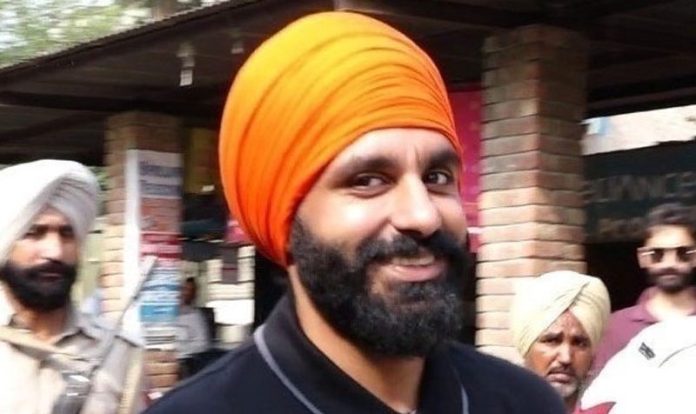Will India and UK learn lessons from West Midlands 3 extradition fiasco?
Last week the UK’s criminal prosecution agency, the Crown Prosecution Service, which was effectively representing the Indian Government in its quest to extradite three innocent Sikhs from the UK on fabricated terrorism charges, suddenly abandoned the case. Conceding that there was no case to answer, the CPS backed out of proceedings that were self-evidently politically motivated and bound to fail in the face of a determined defence put up by the three Sikhs who were wholeheartedly backed by the Sikh community in the UK. Ranjit Singh Srai, co-ordinator, Self-determination Council of the World Sikh Parliament narrates the fallout of the case of the West Midlands 3 on the case of another British Sikh detenue in India -Jagtar Singh Johal.
![Last week the UK’s criminal prosecution agency, the Crown Prosecution Service, which was effectively representing the Indian Government in its quest to extradite three innocent Sikhs from the UK on fabricated terrorism charges, suddenly abandoned the case. Conceding that there was no case to answer, the CPS backed out of proceedings that were self-evidently politically motivated and bound to fail in the face of a determined defence put up by the three Sikhs who were wholeheartedly backed by the Sikh […]](https://www.theworldsikhnews.com/wp-content/uploads/2021/09/Rulda-Singh-murder-case-360x266.jpg)
The dropping of charges against British-born West Midlands 3 young Sikh individuals has come as a huge embarrassment to the Indian state machinery.
It was not only a complete humiliation for the Indian Government but a severe embarrassment for the UK’s Home Secretary Priti Patel, a known admirer of Indian PM Narendra Modi, who had scandalously sanctioned the arrests of the three Sikhs and their extradition to a country notorious for routine human rights abuses.
Critically, those Sikhs could quite easily have been given death sentences by Indian courts for the crimes they were falsely accused of.
The World Sikh Parliament is delighted with an outcome that sees three young men, all of the good standings and with dependant families, emerge without any finding against them. They have endured a nightmare nine-month period starting in December 2020 when the UK police smashed down their doors in needless early dawn raids to arrest them following Priti Patel’s signature on an extradition warrant that defied both common sense and legal norms.
The allegations against the ‘West Midlands 3’ related to an attack on an agent of an extreme right-wing Hindutva group in India in 2009 in relation to which, a UK police investigation (which included sending specialist officers to Punjab) had already found no evidence against these innocent men. With no new evidence since that exoneration in 2011, how was it that the UK’s Home Secretary took the action she did last December?
 The timing of her actions speaks volumes; the UK Government had just agreed to a huge trade deal with its Indian counterpart. Seasoned observers of UK-India relations were under no illusions about the driver of that appalling dereliction of duty by Patel in respect of three UK citizens, born and educated in this country with young families.
The timing of her actions speaks volumes; the UK Government had just agreed to a huge trade deal with its Indian counterpart. Seasoned observers of UK-India relations were under no illusions about the driver of that appalling dereliction of duty by Patel in respect of three UK citizens, born and educated in this country with young families.
She apparently saw no reason why they should not face the inevitable torture in Indian jails, along with the guaranteed unjust outcome in an Indian legal system that has become a mere tool in the hands of a fascist Hindutva-professing ruling elite.
There are important lessons for those culpable of these shameful proceedings and the World Sikh Parliament, along with others, will press home that message to those who have shown themselves unable or unwilling to live by a rules-based international human rights system.
The Indian government, along with its discredited intelligence agencies, should reflect on this debacle and understand that cases such as this can only showcase their ‘outlaw’ behaviour, which Sikhs have long been aware of, but which is now increasingly recognised internationally.
The Indian government, along with its discredited intelligence agencies, should reflect on this debacle and understand that cases such as this can only showcase their ‘outlaw’ behaviour, which Sikhs have long been aware of, but which is now increasingly recognised internationally.
It is time they acknowledged that such behaviour is not acceptable and will not be tolerated by those who espouse the rule of law and democratic norms.
It is a matter of time before Indian perpetrators of the massive, systematic rights abuses against the Sikhs since the late 1970s will be held to account before a legal tribunal; those who now continue the abuses should also be mindful of facing legal sanction for their actions.
The UK Prime Minister Boris Johnson, already embarrassed on several other occasions by his errant Home Secretary should dismiss Patel; she has dangerously jeopardised the reputation of and trust in the UK agencies that pursued this wholly unjust extradition case.
He should think about the impact on community relations in a country where an estimated 700,000 Sikhs live and contribute in every walk of life. The unified resolve of that community in countering Patel on this matter has been both vocal and impressive; she is a liability which any sensible PM should rapidly remove from the political landscape.
The UK Prime Minister Boris Johnson, already embarrassed on several other occasions by his errant Home Secretary should dismiss Patel.
The UK Government must also finally now make some serious efforts to secure the release of another UK citizen, Jagtar Singh Johal, who has been tortured in Indian jails (without any legal redress) whilst held on similar false charges since November 2017.
 The reluctance to take any meaningful action, in that case, once again driven by an unprincipled and undignified chase for trade deals, must now end in the light of last week’s events.
The reluctance to take any meaningful action, in that case, once again driven by an unprincipled and undignified chase for trade deals, must now end in the light of last week’s events.
The collapse of the extradition case highlighted, amongst other things, how Indian police had manipulated evidence to fool the UK courts; if that can happen in high profile international proceedings, what chance is there for justice for ‘Jaggi’ Johal facing a politicised court system in India? The UK must require his immediate release and impose meaningful sanctions on Indian officials and leaders until that happens.
The backdrop to all these sordid dealings (there have been other instances) between the two governments has been an unscrupulous effort to prevent Sikhs, including those in the worldwide diaspora, from raising human rights concerns following India’s undeclared war on the Sikh nation over past decades.
The collapse of the extradition case highlighted, amongst other things, how Indian police had manipulated evidence to fool the UK courts; if that can happen in high profile international proceedings, what chance is there for justice for ‘Jaggi’ Johal facing a politicised court system in India?
It is high time for some wisdom on the part of these governments; rather than facing humiliating reversals, they should recognise that the Sikhs have individual and collective human rights, enshrined in international law, which they will never surrender.
As a nation, the Sikhs have historically always prevailed over injustice. We remain steadfast in our lawful mission to secure peace, prosperity and self-determined freedom in our homeland and no amount of oppression or unethical chicanery will ever change that position.
